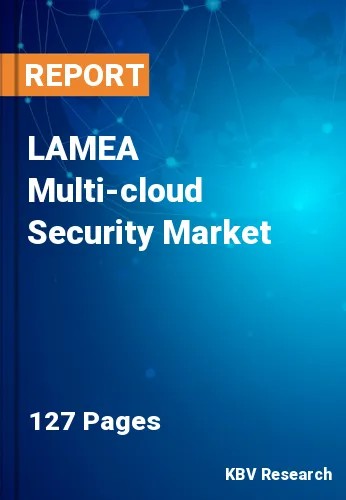The Latin America, Middle East and Africa Multi-cloud Security Market would witness market growth of 20.5% CAGR during the forecast period (2022-2028).
Enterprises are increasingly choosing multi-cloud security solutions due to worries about single-cloud reliability and vendor lock-in circumstances, a tendency towards price-sensitive cloud deployments, and increasing pressure to verify compliance with multiple privacy protection and data security regulations. In addition, due to their improved ability to switch between several providers rather than being dependent on one, end users have more negotiating leverage when using multi-cloud management.
End customers can also use multi-cloud tools to spread their workload across several clouds and provide more versatility in data deployment. As a result, multi-cloud management frequently assists in preventing a situation where a vendor is locked in and enables end users to migrate between suppliers with ease.
Businesses increasingly turn to automation to manage multiple cloud infrastructures with constrained human resources. Cloud automation decision-making is anticipated to be significantly influenced by AI and ML, including thorough log analysis. Solutions and systems based on ML and AI can look for patterns in huge amounts of logging data. The knowledge gained can be utilized to forecast the breakdown of server subsystems or applications. Therefore, cloud automation may significantly aid capacity planning by enabling improved infrastructure demand forecasts.
Businesses in Latin America are refocusing their efforts from investing in technology to effectively using digital transformation initiatives to grow their businesses. As a result, information technology (IT), as well as cloud sourcing, are seeing a lot of opportunity in the new surroundings this competitive approach is creating. In response, cloud service providers are extending their offering of cloud products and services. The key drivers of the Latin American infrastructure-as-a-service (IaaS) sector have been the consumption of cloud-managed services and the use of new technologies like Big Data, the Internet of Things (IoT), and cognitive intelligence. These factors are expediting the expansion of the regional multi-cloud security market.
The Brazil market dominated the LAMEA Multi-cloud Security Market by Country in 2021, and would continue to be a dominant market till 2028; thereby, achieving a market value of $242.3 million by 2028. The Argentina market is experiencing a CAGR of 21.2% during (2022 - 2028). Additionally, The UAE market would display a CAGR of 20.2% during (2022 - 2028).
Based on Offering, the market is segmented into Solution and Services. Based on Application, the market is segmented into Network Security, Application Security and Endpoint & IoT Security. Based on Cloud Model, the market is segmented into Infrastructure as a Service, Platform as a Service and Software as a Service. Based on Organization Size, the market is segmented into Large Enterprises and Small & Medium Enterprises. Based on Vertical, the market is segmented into BFSI, IT & ITeS, Healthcare, Telecommunications, Retail & Ecommerce, Media & Entertainment, Manufacturing and Others. Based on countries, the market is segmented into Brazil, Argentina, UAE, Saudi Arabia, South Africa, Nigeria, and Rest of LAMEA.
Free Valuable Insights: The Global Multi-cloud Security Market is Predict to reach $12.6 Billion by 2028, at a CAGR of 17.4%
The market research report covers the analysis of key stake holders of the market. Key companies profiled in the report include Microsoft Corporation, VMware, Inc., Rackspace Technology, Inc., Check Point Software Technologies Ltd., Amazon Web Services, Inc. (Amazon.com, Inc.), IBM Corporation, BMC Software, Inc. (KKR & Co., Inc.), Proofpoint, Inc., Aqua Security Software Ltd., and Imperva, Inc.
By Offering
By Application
By Cloud Model
By Organization Size
By Vertical
By Country
Our team of dedicated experts can provide you with attractive expansion opportunities for your business.

